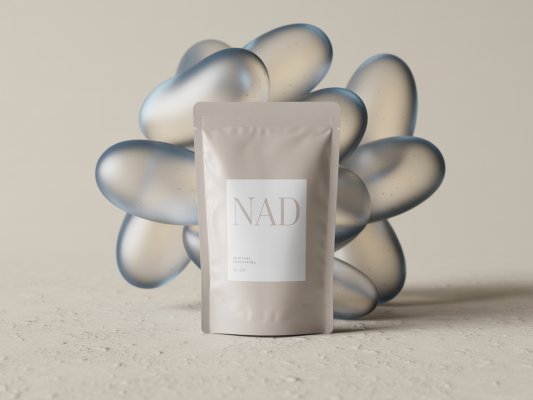
NAD
Description
NAD (Nicotinamide Adenine Dinucleotide) is an essential coenzyme found in every living cell. It plays a vital role in numerous metabolic processes, acting as a key player in cellular energy production and DNA repair. This article provides a comprehensive yet accessible overview of NAD, its benefits, and how to maintain healthy levels.
Quick Overview: NAD At-a-Glance
Key Benefit(s): Supports cellular energy, DNA repair, and healthy aging.
Primary Mechanism: Acts as a coenzyme in redox reactions and a substrate for enzymes like sirtuins and PARPs.
Best For: Supporting overall cellular health, potentially slowing age-related decline.
Typical Dose Range: Varies depending on the precursor (NMN, NR), consult a healthcare professional.
Key Caution/Consideration: More long-term human studies are needed to fully understand safety and efficacy.
Table of Contents
Categories & Effectiveness
Learn about our rating methodologyBrain Health
Neuro-Repair Support
4/10Moderate evidence of effectiveness
Excitotoxicity Defense
3/10Limited evidence of effectiveness
Brain Antioxidant Shield
2/10Limited evidence of effectiveness
Cognition
Memory & Recall
2/10Limited evidence of effectiveness
Energy & Alertness
Cellular Energy (ATP)
7/10Strong evidence of effectiveness
Physical Performance
Blood Sugar Support
2/10Limited evidence of effectiveness
Systemic Health
Cellular Repair
6/10Moderate evidence of effectiveness
Anti-Inflammatory (Systemic)
5/10Moderate evidence of effectiveness
Cellular Anti-Aging
5/10Moderate evidence of effectiveness
Immune System Balance
3/10Limited evidence of effectiveness
Dosage & Side Effects
Recommended Dosage
Potential Side Effects
Bioavailability & Half-Life
Interactions & Stacks
Recommended Products
Hydrolyzed Collagen Peptide Filled Gummies, 1500mg Protein Type I,II,III,V,X,1000mg NAD 15000mcg Biotin Supplement for Sugar-Free Man&Woman,AI-Fomular HCL for Skin,Hair,Nails
- Rated 4.8 stars by 76 customers
- Special offer: Save 50% with coupon
Testosterone Booster for Men over 50, Max Male Test Enhancing Pill, Libido Muscle Growth Super Workout Energy Supplement, Tongkat Ali, Tribulus, Maca Root, Horny Goat Weed, DHEA, Boron 90 Capsules
- Rated 4.0 stars by 4,095 customers
- Premium quality ingredients
NAD+ Resveratrol Boosting Supplement, 1000MG NAD+ Supplement überlegene Alternative, Hohe Absorption, Effizienter für Vitalität & Gesundheit
- Rated 4.7 stars by 664 customers
- Amazon's Choice for quality and value
As an Amazon Associate we earn from qualifying purchases. Prices and availability are accurate as of the date/time indicated and are subject to change.
Benefits by Use Case
Enhanced Cellular Energy
NAD+ is crucial for cellular energy production and ATP synthesis within mitochondria. Supplementation may improve energy levels and combat fatigue, but individual responses can vary.
Support Healthy Aging
NAD+ declines with age, contributing to age-related diseases. Supplementation may support DNA repair and cellular function, potentially slowing down the aging process. However, long-term human studies are needed to confirm these effects.
Cardiovascular Support
NAD+ may support vascular health and improve cholesterol levels. It could potentially benefit heart failure by improving energy production in heart cells and reducing inflammation. However, more research is needed.
Mechanism of Action
Frequently Asked Questions
Where to Buy NAD
Based on quality, price, and customer reviews, here are our top recommended NAD supplements:
Hydrolyzed Collagen Peptide Filled Gummies, 1500mg Protein Type I,II,III,V,X,1000mg NAD 15000mcg Biotin Supplement for Sugar-Free Man&Woman,AI-Fomular HCL for Skin,Hair,Nails
- Rated 4.8 stars by 76 customers
- Special offer: Save 50% with coupon
Testosterone Booster for Men over 50, Max Male Test Enhancing Pill, Libido Muscle Growth Super Workout Energy Supplement, Tongkat Ali, Tribulus, Maca Root, Horny Goat Weed, DHEA, Boron 90 Capsules
- Rated 4.0 stars by 4,095 customers
- Premium quality ingredients
NAD+ Resveratrol Boosting Supplement, 1000MG NAD+ Supplement überlegene Alternative, Hohe Absorption, Effizienter für Vitalität & Gesundheit
- Rated 4.7 stars by 664 customers
- Amazon's Choice for quality and value
As an Amazon Associate we earn from qualifying purchases. Prices and availability are accurate as of the date/time indicated and are subject to change.
Summary & Expert Opinion
NAD+ is vital for cellular energy and repair. While NAD+ precursors like NMN and NR show promise, more research is needed to confirm their benefits. Key Strengths: Supports fundamental cellular processes. Key Weaknesses: Research is still evolving, long-term effects are unclear. Recommendation: Consult with a healthcare professional before supplementing with NAD+ precursors.
Detailed Technical Analysis:
NAD+ metabolism is a complex interplay of biosynthetic and degradation pathways. The salvage pathway, which recycles nicotinamide (NAM) back into NAD+, is crucial for maintaining NAD+ levels. Key enzymes in this pathway include NAMPT (nicotinamide phosphoribosyltransferase), which converts NAM to NMN, and NMNAT (nicotinamide mononucleotide adenylyltransferase), which converts NMN to NAD+. Deficiencies in NAMPT can be bypassed by using nicotinamide riboside (NR), which is converted to NMN by nicotinamide riboside kinases (NMRK1 and NMRK2).
The Preiss-Handler pathway synthesizes NAD+ from nicotinic acid (NA). The de novo pathway synthesizes NAD+ from tryptophan. NAD+ is consumed by enzymes like sirtuins (SIRT1-7), which are involved in DNA repair and metabolic regulation, and PARPs (poly-ADP-ribose polymerases), which are activated by DNA damage. Another key enzyme is CD38, which degrades NAD+.
The age-related decline in NAD+ levels is thought to contribute to various age-related diseases. Supplementation with NAD+ precursors like NMN and NR aims to boost NAD+ levels and counteract this decline. However, the bioavailability of these precursors can vary. For example, NMN is largely converted to NAM in the liver, limiting its direct availability to other tissues.
Furthermore, there are inter-individual differences in the response to NAD+ precursors, potentially due to genetic variations in enzymes involved in NAD+ metabolism. For example, variations in the CYP1A2 enzyme system, which metabolizes caffeine, can also influence NAD+ metabolism.
The precise mechanisms by which NAD+ precursors exert their effects are still being investigated. One proposed mechanism involves the activation of sirtuins, which deacetylate proteins and regulate gene expression. Another mechanism involves the reduction of oxidative stress and inflammation.
While early research is promising, more well-controlled human clinical trials are needed to fully understand the long-term safety and efficacy of NAD+ supplementation.







